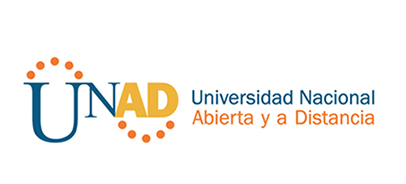INTRODUCTION
The financial market is in a complex process of transformation under the banner of sustainable development, social responsibility but also digitalization; that generates new investment and business opportunities (Matei, 2013; Gurtu, 2020; Panait et al., 2020; Raimi andIsiaka, 2020; Castro et al., 2021; Petrescu et al., 2021; Valenzuela et al., 2021; Voica and Stancu, 2021). The intensification of financial innovation must be accompanied by adequate financial education so that more and more consumers are involved in the financial circuit, to use and make use of financial products and services adapted to their needs and to understand the risks involved in transactions (Matei and Voica, 2013; Ene and Panait, 2017; Iacovoiu, 2018; Siano et al., 2020). Digital finance has fundamentally transformed the manner in which the average individual interacts with money. The advent of online and mobile banking, digital payment and money transfer services is quickly starting to reshape the concept of personal finance management. As cash quickly loses ground in favor of digital money, the personal finance decision making process is becoming increasingly difficult for consumers. In a very dynamic financial landscape, having a good understanding of FinTech innovations and products aids the individual in making confident and informed decisions according to his own financial roadmap. The financial impact of the COVID-19 pandemic on households, coupled with reduced earnings and uncertainties about future income, have also raised awareness towards financial literacy as a means to enable wiser financial decisions.
The aim of the present article is to assess the level of financial literacy and digital financial literacy in the European Union, with emphasis on the potential discrepancies that might exist between different countries within the EU, as well as to investigate general attitudes towards novel FinTech solutions, crypto currencies and digital money.
1. REASEARCH METHODOLOGY
In order to satisfy the objectives of the article, desk research was used to analyze data regarding financial literacy, digital literacy, financial behavior, digital technology adoption, the use of Internet Banking solutions and knowledge and attitudes towards crypto currencies in the European union. Data was collected via the Internet from various sources: Eurostat, OECD, ING. Two independent sources of data were paired in order to identify a potential correlation between the level of financial literacy and the attitude towards crypto currencies.
2. LITERATURE REVIEW
The 2020 Intrum European Payment Consumer Report highlights the fact that 40% of European consumers are trying to improve their financial literacy in preparation for future economic uncertainties, while 47% of those surveyed stated that financial security has now become a major priority (Intrum, 2020). With a quick post-COVID economic recovery unlikely, more governments, NGOs and financial institutions are stepping in to help educate the public on better personal finance decisions. The European Banking Federation’s Financial Literacy Playbook for Europe, published in November 2020, highlights the banking sector’s desire to provide better financial education through more than 125 national initiatives across 35 countries in Europe (EBF, 2020). One of the major effects of the COVID-19 pandemic has been an accelerated transition towards digital finance, cashless transactions, online and mobile accounts as well as a rapid development and adoption of FinTech solutions. The Global COVID-19 FinTech Market Rapid Assessment Study found that the pandemic has provided a boost for the FinTech industry, directly correlated with the strictness of lockdown measures. Growth for the secor has been 50% higher in countries with tighter measures when compared to countries with looser restrictions (CCAF, World Bank and World Economic Forum, 2020). The exponential growth in global interest for digital currencies is forcing the hands of many governments across the world to speed up development of digital versions of their own currencies in order to avoid massive capital migration towards digital assets they have no control over. Things are no different in the European Union where the European Central Bank is currently working on a digital version of the Euro.
FinTech innovation is accelerating at an unprecedented pace, integrating technology into every aspect of the financial services sector. Determining whether or not new technologies aid or impede the individual’s ability to keep track of their finances, as well as the role financial literacy plays in this equation, has been the topic of numerous studies in recent years. Empirical evidence points to the fact that the use of modern financial technologies has a positive effect on the ability of the consumer to make wiser choices when it comes to personal finance. Frequent use of mobile financial services is associated with a higher probability of better money management decisions as well as with the individual’s ability to stay more informed on the latest financial trends (Yeo and Fisher, 2017). And a more informed consumer will prove to be an efficiency driving factor for the financial sector, constantly demanding better products (Castro et al., 2021). A randomized control trial conducted in Northern Ireland found that individuals who received a mobile phone app to track their finances were significantly more likely to have better money management and resilience to financial shocks (French et al., 2020). But as financial institutions rush to implement an ever growing range of FinTech solutions, they must take into account the characteristics of their individual consumers (Stancuet al.,2020) and ensure that their products demonstrate a high degree of usability for the widest possible customer base.
3. FINANCIAL AND DIGITAL LITERACY IN EUROPE – AN OVERVIEW
Financial literacy is a determining factor for the financial wellbeing of individuals. However, in an increasingly more technology-reliant economic system, in which e-banking products will replace both cash and bank cards in the future (Ionescu, Radulescu, 2019), digital competence and digital literacy play a crucial role in the way individuals are able to access modern financial solutions such as mobile payments, money transfer services, digital wallets as well as all other Internet based money management systems. Having a populous that is not only financially literate but also digitally literate will be a determining factor for the success of future attempts at bringing the Eurozone into the age of digital finance. In this chapter we will be analyzing financial and digital literacy in the European Union.
3.1 FINANCIAL LITERACY
There are major discrepancies in the levels of financial literacy amongst countries in Europe. The 2020 OECD International Survey of Adult Financial Literacy included 13 European Union countries. The percentage of respondents who answered correctly to five or more questions on financial knowledge is presented in the graph below.
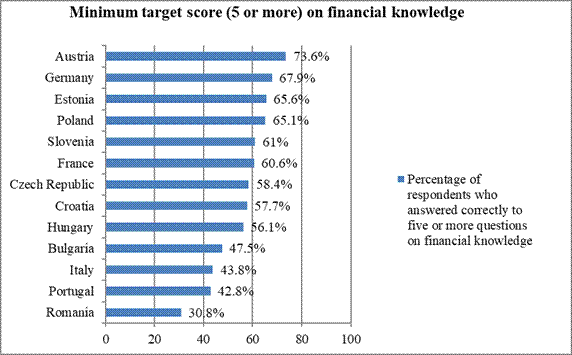 Figure 1
Minimum target score on financial knowledge. Data source: 2020 OECD International Survey of Adult Financial Literacy
Figure 1
Minimum target score on financial knowledge. Data source: 2020 OECD International Survey of Adult Financial Literacy
The survey also assessed the financial behavior of respondents by incorporating questions regarding individuals’ saving habits and financial planning, purchasing habits and cash flow management.
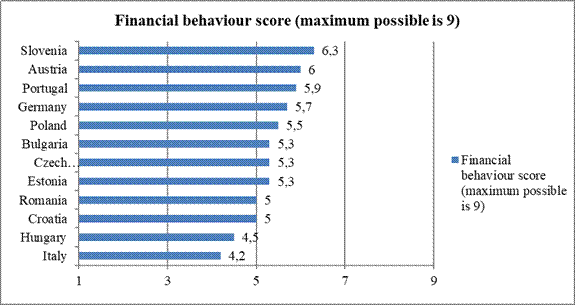 Figure 2
Financial behavior score. Data source: 2020 OECD International Survey of Adult Financial Literacy
Figure 2
Financial behavior score. Data source: 2020 OECD International Survey of Adult Financial Literacy
Financial knowledge and behavior combined are crucial to the individual’s overall financial well-being. Making informed decisions and being wise with money can prevent financial pitfalls and help the individual better cope with events such as job loss, unforeseen expenses and rise in inflation. Having a financial cushion as well as avoiding debt is paramount to personal finance, especially in times of economic uncertainty. An online survey conducted in 2020 by Eurofound (The European Foundation for the improvement of Living and Working Conditions) found that job loss and financial insecurity had become major concerns in the European Union as the COVID-19 pandemic unfolded, with 40% of respondents stating that their financial situation has worsened during the health crisis (Eurofound 2020).
The European Banking Federation’s 2021 Financial Literacy Playbook for Europe has looked at each individual country’s internal policies regarding financial education for the youth and identified each country’s strengths and weaknesses in promoting financial literacy. According to the report, EU countries with compulsory financial education are: Croatia, The Czech Republic, Denmark, Finland, Germany (in three out of fifteen federal states), Malta, Poland, Portugal, Romania and Sweden.
3.2 DIGITAL LITERACY AND DIGITAL TECHNOLOGY ADOPTION
Internet usage by individuals in the European Union is high, with 85% of Europeans going online at least once a week (DESI 2020). However, according to EUROSTAT, the number of individuals who have basic or above basic digital skills is at 56%.
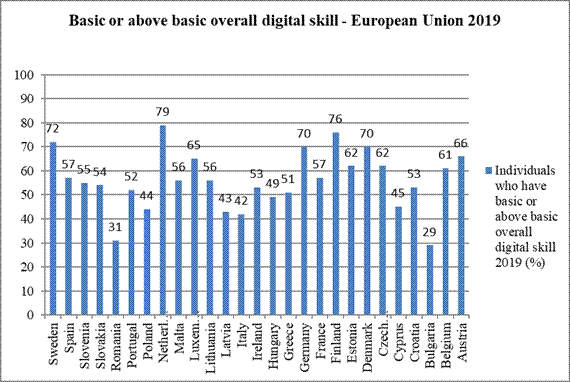 Figure 3
Basic or above-basic overall digital skill. Data source: EUROSTAT
Figure 3
Basic or above-basic overall digital skill. Data source: EUROSTAT
Since modern digital money transfer systems require the use of an Internet-connected mobile device when on the move, the statistic regarding the percentage of European citizens who use a smart phone to access the Internet is also relevant. Data provided by Eurostat shows that in 2019, 71% of people in Europe went online from their mobile phones which marks a six percent increase from the previous year.
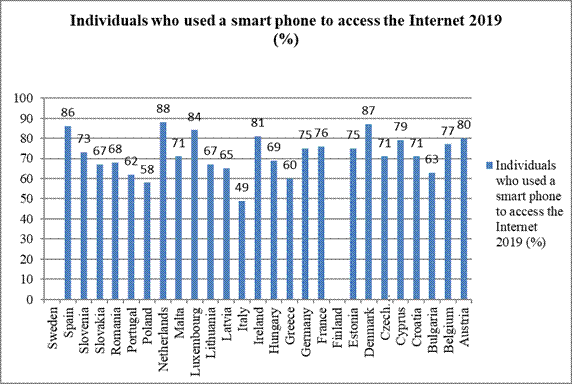 Figure 4
Individuals who used a smartphone to access the Internet. Data source: EUROSTAT (Note: there is no data for Finalnd and Sweden)
Figure 4
Individuals who used a smartphone to access the Internet. Data source: EUROSTAT (Note: there is no data for Finalnd and Sweden)
According to Eurostat data, the adoption of Internet Banking in the European Union is relatively low, with only 57% of European citizens using online financial services in 2020. Ernst and Young's “Global FinTech Adoption Index 2019” shows that 64% of digitally active individuals across 27 markets used FinTech in 2019 with China (87%), India (87%) and Russia (82%) leading the way. Across the European Union, there are major discrepancies when it comes to the adoption of Internet Banking services. Denmark leads the way with 94% of its citizens using digital financial services in 2020 while in Romania, the percentage rests at 12% according to the latest Eurostat data.
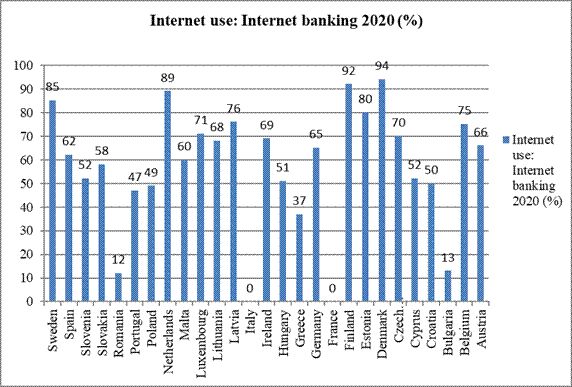 Figure 5
Internet use: Internet banking. Data source: EUROSTAT (Note: there is no data for Italy and France)
Figure 5
Internet use: Internet banking. Data source: EUROSTAT (Note: there is no data for Italy and France)
4. DIGITAL MONEY IN THE EUROPEAN UNION – PRESENT ATTITUDES AND FUTURE PLANS
With crypto currencies recently reaching a total market capitalization of over two trillion Euros, digital money is quickly starting to move beyond its status as a fringe asset and is drawing the attention of central banks across the world. The European Central Bank is currently exploring the option of introducing the Digital Euro and while no decision has been yet taken, the president of the ECB has stated that “The euro belongs to Europeans and we are its guardian. We should be prepared to issue a digital euro, should the need arise.” But while a Digital Euro would be a centralized and regulated currency, as opposed to its crypto currency counterparts, it would still represent a financial novelty and present its own set of unique challenges for the average individual. A report published by the Dutch bank ING in 2019 revealed that while most Europeans had heard of crypto currencies and know what they are, many did not understand how they worked. A survey was conducted on a sample size of 12813 respondents that were asked to assess the validity of five statements about crypto currencies. The results are presented in the table below.
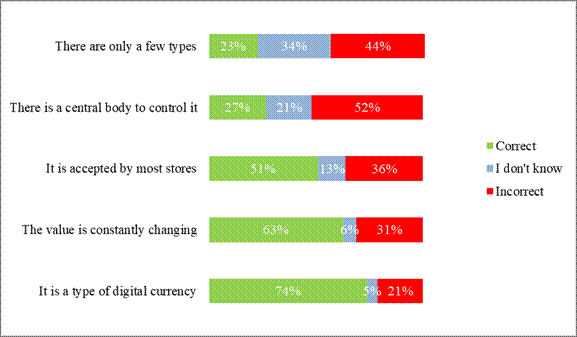 Figure 6
Knowledge on crypto currencies. Data source: ING International Survey New Technologies September 2019
Figure 6
Knowledge on crypto currencies. Data source: ING International Survey New Technologies September 2019
The paper also looked at people’s attitude towards crypto currencies. Five questions were used to generate an index of positive attitudes towards crypto currencies:
- 1.
Are people who bought crypto currencies still happy today?
- 2.
Is this virtual money the future of online spending?
- 3.
Is crypto currency the future of investing?
- 4.
Will the value of crypto currencies over the next 12 months?
- 5.
Should banks open crypto-denominated accounts?
The results were used to generate the index of positive attitude towards crypto currencies in the chart below.
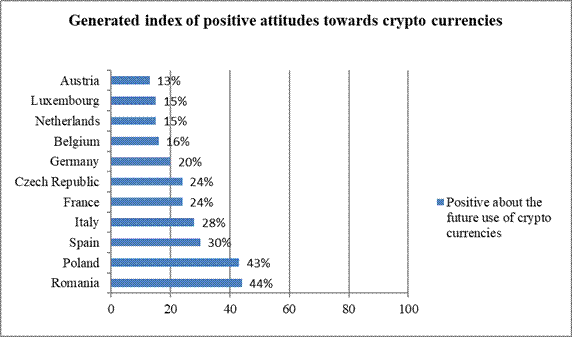 Figure 7
Generated index of positive attitudes towards crypto currencies. Data source: ING International Survey New Technologies September 2019
Figure 7
Generated index of positive attitudes towards crypto currencies. Data source: ING International Survey New Technologies September 2019
By analyzing the results of the OECD Financial Literacy Survey and the Index of Positive Attitudes towards Crypto currencies from the ING study we can observe if there is any correlation between each country’s level of financial education and the attitude towards crypto currencies.
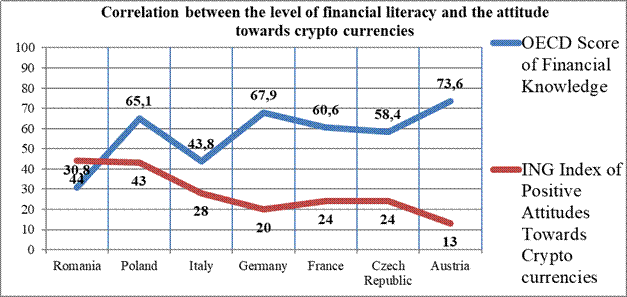 Figure 8
Correlation between the level of financial literacy and the attitude towards crypto currencies. Data source: OECD Financial Literacy Survey, ING International Survey New Technologies September 2019
Figure 8
Correlation between the level of financial literacy and the attitude towards crypto currencies. Data source: OECD Financial Literacy Survey, ING International Survey New Technologies September 2019
The chart above suggests a strong negative correlation between the level of financial education in each country and the population’s positive attitude towards crypto currencies. A high degree of financial literacy is coupled with a distrust of crypto currencies and their future. As they lack central control and are not tied to any organization, crypto currencies also lack the Corporate Social Responsibility factor which often aids in anticipating and preventing the effects of negative events that may affect society, the environment and the economy (Panait, M., Ionescu, R., Radulescu, I. G., & Rjoub, H. 2021). And while negative attitudes towards crypto currencies are not surprising, given the fact that these digital assets lack any form of central control, regulation or backing, while at the same time being extremely volatile, a digital Euro, issued by the European Central Bank will most likely be received much more favorably. A move towards implementing the digital Euro might become a necessity in an increasingly more digitalized global financial system. The People’s Bank of China for example is already conducting trials with a digital version of the Yuan while Russia also intends on launching a digital Ruble in the course of 2021. And while the ECB claims that a decision on whether to release a digital Euro or not has not yet been reached, pressure for financial innovation on the global stage is strong. The European Central Bank’s October 2020 “Report on a digital Euro” reveals that a lot of work is being put into creating a European digital currency; efforts that have been accelerated by the COVID-19 pandemic as well as the popularity that crypto currencies have gained during the health crisis.
6. RESULTS
Evidence suggests that there are significant discrepancies between individual countries within the European Union when it comes to financial literacy, digital literacy, digital financial literacy and attitudes towards crypto currencies. In regards to financial literacy, there is a 42.8% difference between the number of individuals who answered correctly to five or more questions on financial knowledge between Austria (the highest ranking country) and Romania (the lowest ranking country) in the 2020 OECD International Survey of Adult Financial Literacy. In regards to overall digital skill, the Netherlands has ranked highest, with 79% of individuals demonstrating average or above average digital skills, while Bulgaria ranks lowest with only 29% according to data provided by Eurostat. While most individuals in the EU have used a mobile phone to access the Internet in 2019, only 12% have used Internet banking services in 2020 in Romania compared to 94% in Denmark. Data also suggests that a higher degree of financial literacy is paired with a lower level of trust in crypto currencies. While the 2020 OECD International Survey of Adult Financial Literacy ranks Austria the highest and Romania the lowest in regards to financial knowledge, the Index of Positive Attitudes towards Crypto currencies compiled by ING reveals that Austrians have the least positive attitude towords the novel currencies while Romanians have the highest one.
7. CONCLUSION
The global financial landscape is witnessing an unprecedented transformation. As innovation blends traditional financial services with the latest technologies, the consumer needs to become equally as adaptable to the latest technologies in order to reap the rewards that FinTech can provide. Financial literacy and digital literacy must blend together in order to ensure the individual’s financial well-being. Major discrepancies remain between individual countries in the European Union, both when it comes to financial literacy and financial education as well as the adoption rate of FinTech solutions. And in the absence of a unified European strategy in the field, these discrepancies will most likely continue to remain a challenge in the era of digital finance, especially if and when the European Central Bank decides to issue a digital Euro. We believe that a comprehensive EU-wide financial literacy and digital literacy program is required in order to ensure that European citizens adapt quickly to novel financial solutions to achieve the highest possible degree of financial well-being and better withstand future financial shocks and uncertainties.
References
Ahrendt, D., Cabrita, J., Clerici, E., Hurley, J., Leončikas, T., Mascherini, M., Riso, S. y Sándor, E. (2020). Living, working and COVID-19, COVID-19 series. Publications Office of the European Union. https://n9.cl/n4xni
Castro, R., Enríquez-Diaz, J. y García, B. (2021). The role of financial education in the path towards sustainable development: A practical experience with students of secondary education. Financial management and risk analysis strategies for business sustainability (pp. 1-19). IGI Global. http://doi:10.4018/978-1-7998-7634-2.ch001
CCAF, World Bank y World Economic Forum. (2020). The global Covid-19 fintech market rapid assessment report. University of Cambridge, World Bank Group y the World Economic Forum. https://n9.cl/wcsk5
Ene, C. y Panait, M. (2017). The financial education-Part of corporate social responsibility for employees and customers. Revista Romana de Economie, 44(1), 145-154.
Eurofound. (2020). Living, working and COVID-19, COVID-19 series. Publications Office of the European Union. https://n9.cl/tnuan
European Central Bank. (2020). Report on a digital euro. Eurosystem. https://n9.cl/l1zf9
European Comission (s.f.). The digital economy and society index (DESI). https://digital-strategy.ec.europa.eu/en/policies/desi
Eurostat. (s.f.). https://appsso.eurostat.ec.europa.eu/nui/submitViewTableAction.do
EY. (2019). EY global fintech adoption index. https://www.ey.com/en_gl/ey-global-fintech-adoption-index
French, D., McKillop, D. y Stewart, E. (2020). The effectiveness of smartphone apps in improving financial capability. The European Journal of Finance, 26(4-5), 302-318, https://n9.cl/tjie7
Frenken, R. y Folcher, D. (edits.), (2020). Financial literacy playbook for Europe. European Banking Federation. https://n9.cl/p8h5
Gurtu, A. (Ed.). (2020). Recent advancements in sustainable entrepreneurship and corporate social responsibility. IGI Global.
Iacovoiu, V. (2018). An empirical analysis of some factors influencing financial literacy. Economic Insights-Trends & Challenges, 70(2).
ING. (2019). From cash to crypto. The money revolution. ING International Survey. https://n9.cl/un6c6
Intrum. (2021). Financial education in Europe: progress made, but much still to do. https://n9.cl/vtcp0
Ionescu, R. y Radulescu, I. (2019). Behavioral finance and the fast evolving world of fintech. economic insights – trends and challenges, VIII(LXXI) 4.
Matei, M. (2013). Responsabilitatea socială a corporaţiilor şi instituţiilor şi dezvoltarea durabilă a României. Expert Publishing House.
Matei, M. y Voica, M. (2013). Social responsibility in the financial and banking sector. Economic Insights-Trends & Challenges, 65(1).
OECD. (2020). OECD/INFE 2020 International Survey of Adult Financial Literacy. https://n9.cl/n0doa
Panait, M., Ionescu, R., Radulescu, I. y Rjoub, H. (2021). The corporate social responsibility on capital market: myth or reality? Financial management and risk analysis strategies for business sustainability (pp. 219-253). IGI Global.
Panait, M. Radulescu, I. y Brezoi, A. (2020). Financial markets–under the sign of CSR. Some evidences regarding financial education. LUMEN Proceedings, 11, 96-106.
Petrescu, M., Panait, M. y Fu, H. (2021). Integrated management systems under the banner of sustainable development: risks and opportunities. Sustainable management for managers and engineers, (pp. 157-187). Wiley Online Library.
Raimi, L. y Isiaka, A. (2020). Regional review: Africa: CSR in Sub-Saharan Africa: Emerging trends, perspectives and debates. The palgrave handbook of corporate social responsibility, (pp. 1-26). Springer.
Siano, A., Raimi, L., Palazzo, M. y Panait, M. (2020). Mobile banking: An innovative solution for increasing financial inclusion in Sub-Saharan African countries. evidence from Nigeria. Sustainability, 12(23), 10130.
Stancu, A., Panait, M., Raimi, L. y Palazzo, M. (2020). Financial consumers–promoters of sustainable development? Evidences from Europe and Central Asia. Proceedings of the International Conference on Economics and Social Sciences (pp. 841-850). Sciendo.
Valenzuela, M. y Martínez-Martínez, S. y Soto, J. (2021). Financial literacy and innovation performance in SMEs: The mediating effect of risk-taking. Financial management and risk analysis strategies for business sustainability (pp. 58-81). IGI Global.
Voica, M. y Stancu, A. (2021). Corporate social responsibility reporting: background, evolution and sustainability promoter. Sustainable management for managers and engineers, (pp. 109-155). Wiley Online Library.
Yeo, J. y Fisher, P. (2017). Mobile financial technology and consumers’ financial capability in the United States. Journal of Education & Social Policy, 7(1), 80-93.
Weforum. (s.f.). http://www3.weforum.org/docs/WEF_The_Global_Covid19_FinTech_Market_Rapid_Assessment_Study_2020.pdf
Notes
1 Research article
Author notes
2 Researcher of Economics and Finance. Ploiesti, Romania.
